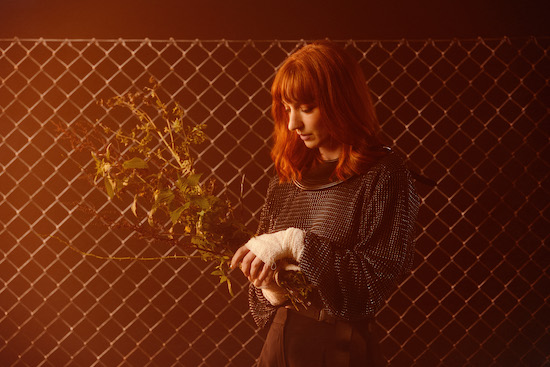Photo: Jay Mawson
In the early days of the telephone, people worried it could be used to communicate with the dead. In 2021, with holograms performing on festival stages and facial recognition in airport security, the prospect of speaking to the departed seems plausible. Quaint, even. Listening to a LoneLady song where the refrain is, “There is no logic” whilst reading about such morbid telecommunications lends a Partridge-like edge to such anxieties. Sitting down with Former Things, prompted by the plethora of similarly caustic motifs incorporated within its soundscapes, I thought of Future Shock.
Published in 1970, Alvin Toffler’s best-selling book (made into a documentary narrated by Orson Welles in ‘72) examined the ways humans would have to adjust their lifestyles to keep up with the rapid rate of technological advancements. His theories surrounding the relationship between society and the evolution of industry led to the popularisation of the phrase, ‘information overload’.
There is a strong case to suggest that Former Things, Julie Campbell’s third offering under the LoneLady moniker, could be a record built from such concerns, forged over forty-years ago. This is strengthened by the scorched earth tones presented in tracks like ‘Threats’ and lyrics sprinkled with technological imagery: static, circuitry, memory, ether. If you look for it, the answers you seek will appear.
However, the further you delve into the subject matter of these eight tracks, the more you realise that it’s not a fear of technological advancement or even a dystopian presentation of industry that looms heavily over this work. Campbell’s concerns are far more disturbing than robots overthrowing humanity. Former Things concentrates on time – its passing and the struggle of losing the fearless wonderment and unbridled dreams of childhood. Moreover, she reassesses the role of dreams in her adulthood, proffering a deflated view: “Were your dreams only made to disappear?”
Opening her first record since 2015’s Hinterland, Campbell intones, “O youthful wonder it was all inside when I was a child. Why does it fall so far away?” The pretty New Order-like guitar tones on the intro to ‘The Catcher’, first track on Former Things, guide the listener through a dense jungle of bouncing 808 patterns, samples that lacerate the ear, and sludgy bass notes. An inherent tetchiness shapes the arrangement which is heightened by Campbell’s delivery across the song, right to the end where she repeats, “Future, oh no, I don’t look at the future.” Here, the crux of the album is firmly established. This is a record in which Campbell is suspended between past and future. The machine-funk tendencies of the instrumentation throughout do well to make the world in which she inhabits a sparse stopping-gap before taking the next step forward. Her humble presence makes her a perfect leader to navigate such universal, existential concerns.
At one point or another, everyone experiences periods of over-thinking time and their position within its structure: Where does it go? Can we reclaim it? What have we done in the time that we’ve been on Earth? How much time do we have left? These are some of the core questions Campbell posits and reflects upon with regards to her life here. This difficult personal undertaking is offset by gloriously multifaceted 1980s synth-pop arrangements that help ease the intensity of lines like, “The dirt is the only winner and your body knows it.” The finality of such a statement heard on ‘(There Is) No Logic’ is almost masked by a marriage of Human League and Pet Shop Boys’ infectious strands of electro-pop. Despite her lyrics on this occasion being her most personal to date, she invites the listener to see themself in the songs by setting them to expressive and welcoming compositions like ‘Former Things’ and the spacious ‘Treasure’. Elsewhere, echoes of Prince and Chaka Khan on ‘Time Time Time’ lend a lightness to the mood.
An integral aspect to Campbell’s music has always been Manchester. The greyscale dereliction of its landscape proved to be a perfect canvas for her to cultivate bold and bright arrangements as a foil against the desaturated tones of the city since 2010. This representation of the urban landscape, one often overshadowed by its successes with the bands it has produced over time, has always been realised with modest means in her home-built studio, a telecaster and a drum machine in tow. In June 2016, however, Campbell relocated to London and set up a studio in Somerset House Studios Rifle Range, a former shooting gallery which has been reappropriated as an experimental performance space. The change of scene allowed Campbell to remove herself from her hometown which, as she describes in the album’s press release, felt like “a giant living diary, an archeology of myself, layered with memories.” A fresh start came in the form of a concrete hallway which she transformed into a space between, “part art-installation, part nightclub where [she] could turn the volume up loud.”
And hearing these songs at full volume serves them best. Tonally, previous releases Nerve Up (2010) and Hinterland (2015) were uniformly joyous in how she fused electro and indie sensibilities together. This latest offering presents a style that works as a natural progression of her sound and a comfortable bedfellow to the soundscape of the previous releases. Former Things indicates more ambition, comfort in shifting tones and overall sophistication in its production which ultimately proves a more rewarding listen. A thought-provoking and reaffirming record.



